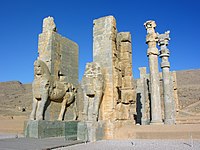| Revision as of 20:19, 3 September 2014 editMarcocapelle (talk | contribs)Extended confirmed users, Page movers555,714 edits removed great-grandparent category of Ancient Iranian people← Previous edit | Revision as of 19:58, 11 October 2014 edit undoJack-ONeill55 (talk | contribs)164 editsm LinkfixNext edit → | ||
| Line 5: | Line 5: | ||
| The first dateable mention of this nomad confederacy appears in the list of nations of ] ''Daeva'' inscription. In this list of the peoples and provinces of the ], the Dahae are identified in ] as ''Dāha'' and are immediately followed by a "]" group, who are listed as being neighbors of the ''Dāha''. However, it is unclear whether the Dahae are also the *Dāha people (or *Dåŋha, only attested in the feminine ''Dahi'') of the ] '']'' 13.144. An etymological relationship "is not proof that the two names refer to the same ethnic group."<ref name="deBlois_1993_581">{{harvnb|de Blois|1993|p=581}}.</ref> | The first dateable mention of this nomad confederacy appears in the list of nations of ] ''Daeva'' inscription. In this list of the peoples and provinces of the ], the Dahae are identified in ] as ''Dāha'' and are immediately followed by a "]" group, who are listed as being neighbors of the ''Dāha''. However, it is unclear whether the Dahae are also the *Dāha people (or *Dåŋha, only attested in the feminine ''Dahi'') of the ] '']'' 13.144. An etymological relationship "is not proof that the two names refer to the same ethnic group."<ref name="deBlois_1993_581">{{harvnb|de Blois|1993|p=581}}.</ref> | ||
| In the 1st century BCE, ] (''Geographika'' 11.8.1) refers to the Dahae explicitly as the "Scythian Dahae" ("]" is in Strabo not necessarily an equation with the "]"). The historiographer further places the Dahae in the approximate vicinity of present-day ]. | In the 1st century BCE, ] (''Geographika'' 11.8.1) refers to the Dahae explicitly as the "Scythian Dahae" ("]" is in Strabo not necessarily an equation with the "]"). The historiographer further places the Dahae in the approximate vicinity of present-day ]. | ||
| The Dahae, together with the ] tribes, are known to have fought in the ] armies at the ]. Following the fall of the Achaemenid Empire, they joined ] in his quest to ]. Saka coins from the ] era are sometimes specifically attributed to the Dahae. | The Dahae, together with the ] tribes, are known to have fought in the ] armies at the ]. Following the fall of the Achaemenid Empire, they joined ] in his quest to ]. Saka coins from the ] era are sometimes specifically attributed to the Dahae. | ||
Revision as of 19:58, 11 October 2014
The Dahae (Template:Lang-fa; Sanskrit: Dasa; Latin: Dahae; Template:Lang-el ( Error: {{Lang}}: text has italic markup (help)), Δάαι, Δᾶαι ( Error: {{Lang}}: text has italic markup (help)), Δάσαι ( Error: {{Lang}}: text has italic markup (help))), or Dahaeans were a confederacy of three Ancient Iranian tribes who lived in the region to the immediate east of the Caspian Sea. They spoke an Eastern Iranian language. It was known as Dihistan and Dahistan during the Sassanid period.
Records
The first dateable mention of this nomad confederacy appears in the list of nations of Xerxes the great Daeva inscription. In this list of the peoples and provinces of the Achaemenid Empire, the Dahae are identified in Old Persian as Dāha and are immediately followed by a "Saka" group, who are listed as being neighbors of the Dāha. However, it is unclear whether the Dahae are also the *Dāha people (or *Dåŋha, only attested in the feminine Dahi) of the Avestan Yasht 13.144. An etymological relationship "is not proof that the two names refer to the same ethnic group."
In the 1st century BCE, Strabo (Geographika 11.8.1) refers to the Dahae explicitly as the "Scythian Dahae" ("Scythian" is in Strabo not necessarily an equation with the "Sacae"). The historiographer further places the Dahae in the approximate vicinity of present-day Turkmenistan.
The Dahae, together with the Saka tribes, are known to have fought in the Achaemenid armies at the Battle of Gaugamela. Following the fall of the Achaemenid Empire, they joined Alexander of Macedon in his quest to India. Saka coins from the Seleucid era are sometimes specifically attributed to the Dahae.
In the third century, a branch of Dahae called the Parni would rise to prominence under their chief Arsaces. They invaded Parthia, which had just previously declared independence from the Seleucids, deposed the reigning monarch, and Arsaces crowned himself king. His successors, who all named themselves Arsaces and are thus referred to as the Arsacids, would eventually assert military control over the entire Iranian plateau. By then, they would be indistinguishable from the Parthians, and would also be called by that name.
While 'Dahae' was preserved in the toponym 'Dahestan'/'Dihistan' - a district "on the eastern shore of the Caspian Sea" - "an urban center of the ancient Dahae (if indeed they possessed one) is quite unknown."
References
- Francisco Rodríguez Adrados (1994). basileutos - daimōn, Vol 4, p. 859: "Δᾶαι"
- de Blois 1993, p. 581.
- Bivar 1993, p. 27.
Bibliography
- Bivar, A.D.H. (1993), "The Political History of Iran under the Arsacids", in Fischer, W.B.; Gershevitch, Ilya (eds.), Cambridge History of Iran, vol. 3.1, London: Cambridge UP, pp. 21–99
- de Blois, François (1993), "Dahae I: Etymology", Encyclopaedia Iranica, vol. 6, Costa Mesa: Mazda, p. 581
| ||
|---|---|---|
|  | |
| See also Taxation districts of the Achaemenid Empire (according to Herodotus) | ||
| Provinces of the Sasanian Empire | ||
|---|---|---|
| ||
| * indicates short living provinces | ||
